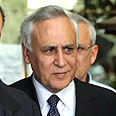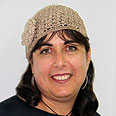The survey was conducted by the Panels institute among 501 respondents – a representative sample of the adult Jewish population in Israel.
Eighty-three percent of all respondents said they do not agree with the rabbis' claim that Katsav is not guilty and has suffered injustice, 9% agree with the claim, and the rest have no opinion on the matter.
Among seculars, 5% agree with the rabbis' stance, among traditional Jews – 10%, among the religious public – 16%, and among haredim – 29%.
Rift not expected
As for the status of the rabbis who signed the letter, 38% of the respondents believe that it will become weaker – both in the eyes of the religious and secular public, 18% predict that it will become stronger in the eyes of the religious and weaker in the eyes of the secular, 5% think the rabbis' status will become stronger among the seculars and weaker among the religious, and 2% believe their status will become stronger among both.
Thirty-seven percent believe there will be no change in the public's attitude towards the rabbis who signed the letter.
Sixty-four percent of the religious respondents believe the rabbis' status won't change at all following their letter of support for Katsav. This was the common response among haredi respondents as well – 42%. Meanwhile, 41% of seculars and 40% of traditional Jews predict that the attitude towards rabbis will change for the worse among all sectors.
The attitude towards Religious Zionism – the movement the letter's signatories belong to – will not change among the majority of the public either. Forty-six percent of respondents said their attitude towards Religious Zionism had not changed, as these rabbis were "marginal", 30% said their attitude had changed slightly (because the sector's rabbis are at odds over Katsav), while 9% stated that "on the contrary, the religious public has revealed itself as courageous and fighting for justice."
The remaining 15% did not hear about the rabbis' letter or were not interested in the issue. The most common response in all sectors was that the attitude toward religious Jews had not changed.
Asked whether the rabbis' support for Katsav would cause a rift among the Religious Zionism movement, 60% said no and 15% said yes. This division reflects the atmosphere among each of the groups – haredim, religious, traditional and secular.
'Self-examination required'
Shosi Becker, Yesodot's educational director, says "the survey shows that an overwhelming majority in the public is not convinced that an error was made in Katsav's sentence, but it also reveals the religious and haredi public's growing alienation towards the legal system.
"Although only one-sixth of the religious respondents believe that Katsav is innocent, about one-third are not certain that he is guilty – and this is a grim picture which requires self-examination on the part of the legal system, as well as the religious and haredi public."
According to Becker, the survey concludes that rabbis supporting Katsav must present serious legal arguments for his innocence, or take back their remarks – otherwise they are contributing to increased polarization and breaking the Jewish-democratic strings holding the Israeli society together.
"We, as an educational institution, learn from this survey that our work is extremely crucial these days," she says. "We must all provide Jewish and general tools to all of Israel's educators, so that they continue instilling faith in the State's institutions and in the values critical for its continued existence."
- Follow Ynetnews on Facebook

















